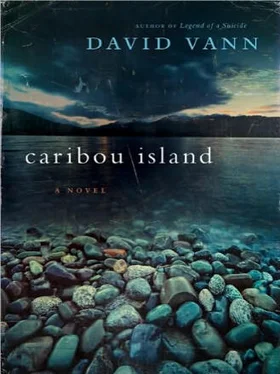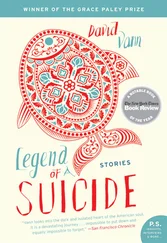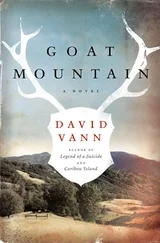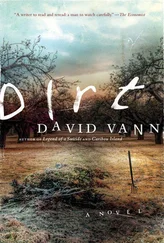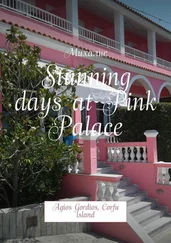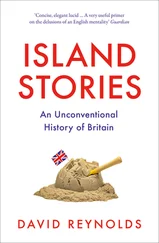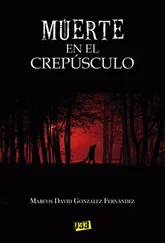They came down out of the mountains and drove along the water, Turnagain Arm, a long fjord, sheer rock on either side, white-tipped. Following the path of some ancient glacier that might have filled this valley and bay, though Irene didn’t know whether that was true. The water was like a river, in standing waves six feet high, the “bore tide” so extreme it actually had a sound, a low roar. In winter, the ice choked here and broke, deep rivers and ravines carved through piles of blocks the size of cars and even houses. No one out on this water.
She wondered whether Iceland was like this. She’d never been. Still had relatives, but none who had ever seen her. They’d be strangers, and she’d no longer be able to speak. Until ten, she’d spoken only Icelandic at home, English at school, but then that language died for her.
She had lost the stories, also, children’s tales. Her memory now was only of figures in landscape. She had lost their movement and words, their purpose. A figure in the forest, the sense of that forest, frightening, or a figure on the sea, some kind of small boat, an ancient ship. A stone house, but she couldn’t be sure even of this. It could have been a wooden house with a stone hearth.
And songs. There had been those, too. Hopelessly lost.
But she did have things she knew. Her mother had experienced some awful pain in her head and asked for silence. What she didn’t know was the source. Was it grief, at her husband’s leaving? Did it last a very short time, only at the end, or did it go on for years? Was it only medical, something like what Irene had now? And was there such a thing as only medical? Once something took over your life, didn’t it become who you were, even if it was only a physical thing?
Irene closed her eyes and tried to exhale the pain, let it slip lower. Was she inventing all of this about her mother? Had her mother really ever complained of a pain in her head? Irene had no image, no moment of her mother rubbing at her forehead, no proof. And she didn’t trust the tricks of her own mind. Whatever she wanted to remember, she would begin to remember, until she wouldn’t know what was real. She had a memory of her father, for instance. They rode a sled together, a wooden sled with metal runners. They walked up a giant hill of snow, her father carrying the sled, and they were laughing. When they reached the top, her father lay facedown, his hands on a steering bar. Irene lay down on top of him, her body small and light, and wrapped her arms around his neck. Her father let out a whoop and they started moving. Irene yelled in fear and delight, and they flew at incredible speed down that slope. But then there were different versions of the ending. In one, they flipped and slid and rolled and landed in a pile together, laughing. In another, they went so fast Irene’s body became airborne, and she struggled to hold on to her father’s neck. In another, they flipped and hit hard and she cried. No one of these endings was more real than the next, and so it seemed the entire thing was made up. Most likely, there had never been a sled at all. She had no other memories of it. The entire scene too idyllic, a winter scene. An attempt to have a memory with her father.
He was young when she last saw him, in his early thirties. Blond hair, not the usual dark hair of an Icelander. A small face, burned by the sun. A forester, leaving each day with his axe. Almost a figure out of one of the children’s stories, and this was what she feared. That she had invented every part of him. Did he really leave every day with his axe? Did he wear a green scarf wrapped around his neck?
She did remember his arms and his hands. Strong forearms, tanned and veined. His hands rough, callused. She could see them on the dark wooden table at meals. She knew that was real, a memory. It was when she tried to see his face or hear his voice that she became lost.
Do you remember your parents? she asked Gary.
What? Gary seemed startled.
Sorry. I’m trying to remember my parents when I was a kid. Their faces, their voices. Do you remember yours?
Yeah, of course.
What do you remember?
Well a lot of things.
Give me one.
Geez, Irene. I don’t know just offhand.
Just remember one for me.
Yeah, Dad, Rhoda said from the back seat, smashed sideways into the king cab. I’m curious, too. You never talk about anything from your childhood.
It’s like the Inquisition, Gary said. I’m just thinking about our appointment and where we’ll stay tonight. But fine. A childhood memory. Something from Lakeport. How about a hunting memory?
No guns, Irene said. You’re too stuck on guns. All the stuff you shot when you were a kid. Give us something else.
Yeah, Rhoda said.
Geez. All I can think of right now is hunting or fishing.
Give us something in the kitchen, Rhoda said.
Gary puffed his cheeks. All right, he finally said. It’s not one particular time. I just remember my dad sitting at the table by the window, looking out at the lake, pouring cream of mushroom soup from a pot onto his pancakes. And I remember him making colored pancakes for me. Blue and green and whatever I asked for.
What did he say? Irene asked.
What?
What did your father say to you when he was making the pancakes or pouring the soup over them?
I don’t know.
That’s what I’m asking, Irene said. I want one moment when you remember exactly what he said, or what your mom said, and how their faces looked at that moment.
Why are you asking this, Mom?
Because I can’t remember my parents, not even one moment.
No one said anything then for a while, so Irene looked out her side window at rock and trees, the rough flanks of mountains. These rocks tell us as much about ourselves as our memories do, she said.
The rocks a kind of sign of all that was true in the world, Irene thought. In layers and bands, identifiable, organized, but all of it was in fact meaningless. Formed under pressure for millions or billions of years, heaved upward, bent and sheared, all to no effect. The rocks were only what they were. There was nothing awaiting them, and they were not part of a story.
We live and die, Irene said. And it doesn’t matter whether we remember who we are or where we came from. It was another life.
I don’t think that’s true, Mom.
You’re still young.
I’m still trying to remember, Gary said. And all I can remember are the tense moments. Those are the only ones that stay. Playing pinochle, and my dad had a lay-down hand, but I didn’t understand it, so I said something like, Wait, how did that happen, and then my dad said, Are you accusing me of cheating? I remember he said exactly that, and I remember how his face looked, unforgiving. He’d already decided, and whatever I said or my mom said didn’t matter.
You remember, Irene said. You really do remember.
Yeah. And other moments, too, but only tense ones for some reason. My dad offering to pay me five cents per walnut to pick them up out of the front yard, and my mom saying, Doug, that’s too much, and how worried she looked, and how that made me feel afraid for some reason, like something terrible was going to happen. My earliest worry about money, I think. I remember what her face looked like then.
Irene put her hand on Gary’s shoulder. Thank you, she said. I believe those. And I don’t know why I can’t remember even one myself.
You must have at least a few, Gary said.
No. I really don’t.
I have a zillion memories of you guys, Rhoda said. When I think back, it’s like you never shut up.
Gary laughed. Thanks, honey.
Irene smiled. She had never wanted to be a mother, not really, but she had gotten lucky with Rhoda. Not so lucky with Mark.
The road ahead, as they neared Anchorage, was clogged with motor homes, the last of the summer visitors. Some pulled over to look at waterfalls or the inlet. They were gathering back at Anchorage for the long drive down through Canada to the lower forty-eight. Snowbirds, heading back to Arizona and Florida.
Читать дальше
